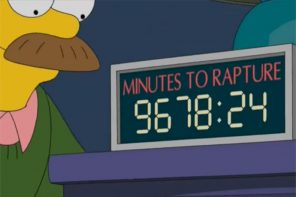Summer is a predictable time for academic migrations. New positions offered as early as last fall are now approved and finalized, and those who’ve been selected begin the transhumance of the professorate like a great herd of intelligent wildebeests. Actually, a very small herd. Maybe an endangered one.
With the announcement this past week of the dismissals of yet two more religion professors following doctrinal innuendos, the plight of the endangered comes forcefully to mind. Just under a year ago we were reading about nearly the entire faculty of General Seminary in New York being dismissed. The final week of June we heard of Thomas Jay Oord‘s ouster from Northwest Nazarene University (in the wake of a threatened “heresy trial”) and Daniel Kirk’s decision to leave Fuller Seminary.
On his personal blog, Kirk wrote: “Fuller has this phrase, ‘Fuller fit,’ that we use to evaluate potential colleagues. It’s an amorphous way of saying that we know “us” when we see it. My senior colleagues have decided that I do not qualify under this rubric. I will therefore be leaving at the end of the 2015-16 academic year.”
Both cases revolved around doctrinal issues where the professor and the institution did not see eye-to-eye. These follow the similar expulsions of Christopher Rollston and Peter Enns in recent years. There are actually many more; it’s easy to lose count.
Professors lose jobs all the time, but these are special cases. Tenure was instituted in higher education to protect faculty from threats should they come to conclusions out of sync with their school. It used to be called academic freedom. These recent situations, however, have all resulted from statements or publications that have failed administrative approval on theological grounds.
Some topics, it seems, are not even open for discussion.
I suspect that those of us among the more liberal crowd might be tempted to see this as the inevitable implosion of conservative institutions, but I find it far more troubling than that. Having spent a decade and a half at a conservative seminary before facing a similar non-negotiable non-tenured option, I’ve devoted a lot of time to thinking about this. Ten years, in fact, and counting. It’s not just the fate of conservatives being weighed here—it is the very nature of higher education.
Higher education is a complex conglomeration of colleges (two and four-year), professional schools, graduate institutions, and research universities. America has a great many of these schools, and several of them offer some kind of program to study religion. Obviously, seminaries and many Christian colleges take a doctrinal stance toward how religion is taught. In some cases they require signatures affixed to statements of faith. How belief and learning might coexist, however, is seldom considered—but this issue is at the crux of education itself.
Education discomfits. Scientists are fond of informing us that the apparent reality of the everyday world doesn’t match the close study of the details. I don’t know that I’ve ever met a boson, but I have to believe they exist. To learn science the obvious must be challenged, and frequently displaced. Scientists looking at religious studies sometimes marvel at how facile much of it seems. Some guy two millennia ago allegedly said something that has gone unchallenged ever since, and teaching that to students is called higher education? Those who’ve been through a graduate program in any field of religious studies know that the disciplines involved have developed their own scientific means of testing data. In the case of biblical studies, for instance, comparative philology is not for the faint of mind.
Those teaching in doctrinal schools live with dual tensions, perhaps even treble. Not only are they duty- or honor-bound to keep to what the school proclaims, they are also bound by intellectual honesty to remain true to what they’ve learned. A third possible tension is their own internal dissonance between what they believe and what they know. With the crisis in higher education, the likelihood of being able to make a lateral move of any kind is extremely slim. The only real choice available is to toe the party line and hope that they don’t say, publish, or imply anything that calls their commitment into question. It may not seem such a crisis, since those unordained may have promising futures as baristas. When the axe is laid to the roots of the tree, it’s a good time for a latte.
This situation should be of concern to anyone who values higher education. The serious study of religion is made to look parochial and foolish to those in other academic disciplines when minor differences of opinion are grounds for dismissal. In the case of religious studies a professor is dismissed, in all likelihood, for simply being honest. That’s a worrisome fact in anyone’s book. Academic freedom, anyone? When religious institutions can’t bear honesty, where are we to look for religious integrity? Seriously, God can’t handle a little honest questioning? In what is the faith of the faithful placed?
The great academic migration gets smaller every year. The summer feeding grounds are growing smaller, and the herd is being culled. This should be a concern to any member of the species.





